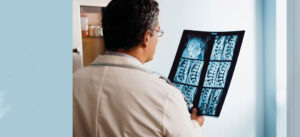Ask the Experts May 7, 2017

As seen in the Tri Town News.
Stephanie W. from Freehold asks:
“My nephew was recently in a car accident and is still in the hospital. He was originally in I.C.U. but is now in a regular room. The doctor said that he has a spinal cord injury, but it is still too early to determine how bad the injury is. I read your column every month and remember you saying something about the spinal cord affecting the brain. Could you give me an idea of what he could be facing here?”
Hi Stephanie! First off I want to tell you that I am so sorry for everything that you and your family are going through in regards to your nephew’s accident! The fact that he was moved into a “regular room” from the Intensive Care Unit is promising news! Unfortunately, it’s difficult to answer your question about what the road to recovery may look like for your nephew without the details of his condition (where in the spinal cord the injury is, how severe the injury is, etc.), however I’m happy to give you an overview of spinal cord injuries in hopes that it will help you and your family on this road to recovery.
The spinal cord is known in the neuro field as the “neurological superhighway of the nerves”. It controls all nerve communication between the brain and the rest of the body, and is responsible for carrying pout all functional capabilities sent from the brain. Think of the spinal cord as a bridge between the brain and the body. In the event of a spinal cord injury (like your nephew), changes in muscular and/or sensory functions may result. These changes may be temporary, however could also be permanent.
Muscular change possibilities will vary depending on the location of the injury. If, for example, the injury is to the lower part of the spinal cord (known as the sacral area and the lumbar area), the injured person may develop issues with their hips, legs, and possibly bowel and bladder issues. If, on the other hand, the injury is to the upper part of the spinal cord from the chest up through the neck (known as the thoracic and cervical areas), the injured person may have issues with their arms, chest or even breathing problems.
Education on the patient’s disease is an equally important aspect of cardiac rehabilitation. At Allaire rehab & nursing upon admission you will be given a booklet explaining your cardiac condition and ways to improve your symptoms through dietary modifications, exercise techniques, relaxation and guided imagery. You will also have a specific diet set by our dietitian and educated on the details of this diet. Medications and any procedures will be explained to you as well. It is important for the patient to understand all aspects of treatment in order to continue with this new lifestyle at home. Also part of the education process is stress reduction. Stress has a huge effect on a person’s heart and learning ways to decrease stress is a very important part of keeping your heart healthy.
It is usually said that the higher in the spinal cord the injury, the worse the sensory and/or muscular issues may be. This may be a result of the injury being so close to the brain. In addition to the muscular issues mentioned above, a person may also experience sensory issues such as hand-eye coordination, balance problems, or ringing in their ears.
Most important to know here Stephanie is that early intervention is key. It is imperative that your nephew begin physical therapy and if necessary cognitive and/or speech therapy as soon as he is able to. Studies have shown that injured people who begin therapy immediately after the injury (once medically stable of course), have much higher recovery rates (such as partial or full function recovery, return to work abilities, and better quality of life) than those who waited a longer period before beginning therapy.
If I can be of any assistance to you through this process please feel free to either reach out to me via email at bgallo@allairehc.com, or even reach me on my cell phone at (732) 865-0767. I am happy to help however I can whether it be giving advice, taking your nephew into Allaire for rehabilitation, or simply lending an ear. Thank you so very much for reaching out to me with your question, and I hope that I will get the chance to do another article in the (hopefully) near future about how amazing your nephew is doing!!!!
Brie Gallo is the Director of Case Management and Physician Relations for Allaire Rehab and nursing center. Please submit all questions to bgallo@allairehc.com